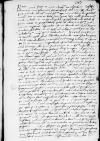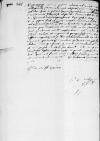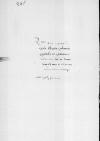Ab hac appellatione, qua merito cum Dominatione Vestra Reverendissima ago, non me continebo, quemadmodum hoc a me in ⌊⌋, Dominatio Vestra Reverendissima petit, quandoquidem eodem me titulo, quam primum ⌊maiestas regia⌋ praesentationem, quam iam etiam Dominatio Vestra Reverendissima habet, ad me miserat, dignata est,
et deinde omnes, qui ad me ex ⌊Regno⌋ scribere solebant. Ferat ergo non indigne, quod pro rei dignitate Dominationi Vestrae Reverendissimae tribuitur. Excusationem, quam pro se et ⌊venerabili capitulo⌋ fecit, libenter admitto. Angustia temporis utrimque congratulationes gratiarum publicasque actiones, ut ex more et re convenit, impedivit. Quod tamen commode, postquam ex ⌊nostris comitiis⌋, quibus non sine causa Dominationem Vestram Reverendissimam cupiebam interesse, rediero, fieri poterit, tumque tempus, ut postulat Dominatio Vestra Reverendissima, significabo.
Quod ⌊princeps ille phanaticus⌋
cf. Adagia 1526 No. 646 Aiacis risus ⌊cum ⌊suo Aiace⌋cf. Adagia 1526 No. 646 Aiacis risus ⌋ agit, nihil vel me, vel Dominationem Vestram Reverendissimam movere debet.
cf. Ov. Am. 1.4.54 ⌊Consilium nobis resque locusque dabuntcf. Ov. Am. 1.4.54 ⌋ etc. Risum tamen reprimere non potui illorum legens de urso insaniam, quam pulchre in loco protulisse se sunt arbitrati. ⌊⌋, sed vix credo illum ulli meas ostendisse litteras.
Decretum postulationis et litteras Dominationis Vestrae Reverendissimae unacum regiis, quas spero me non gravate duplicatas, ut vocant, habiturum, per bancum opera ⌊Georgii Hegel⌋ ⌊Fuggarorum⌋ factoris mittam ad ⌊urbem⌋ in manus ⌊domini Theoderici⌋. Cui scribam de eoque praesertim, quod ad expeditionem Dominationis Vestrae Reverendissimae pertinet, ut diligenter perquirat, quantum recentes mei praedecessores pro confirmatione impenderint. Ego coactus fui ad integram taxam septingentorum ducatorum, ut in annatarum habetur libro. Tantundem et reliqua fere expeditio constitit, insigniterque mihi in eo iniuria
facta est, a qua ut Dominationem Vestram Reverendissimam asserat non movebo.[1]
Cum transumpto regiarum litterarum cum ⌊capitulo meo⌋ sic agam, quod et votis Dominationis Vestrae Reverendissimae fieri satis possit, et ⌊maiestatis regiae⌋ iuspatronatus et gratia nobis integra conservetur. De auro et nuntio ⌊Romam⌋ mittendo inter nos ut colloquamur, necesse est, pecuniae tamen, quibus mille aurei possint conflari, ad me, cum rediero, mittantur, aut per Dominationem Vestram Reverendissimam adferantur. Invenietur a me modus, ut pro eis aurum haberi possit etc.
De ⌊Hosio⌋ non potui ⌊reverendissimo domino Cracoviensi⌋ cessionem negare, cuius misi instrumentum, scripturus, quae oportuna videbuntur, fore sperans, quod dominatio eius reverendissima rationibus meis mota instrumentum retinebit etc.[2]
Rescripsissem Dominationi Vestrae Reverendissimae uberius ad omnia, nisi
iam colligendae sarcinulae me abstraherent, iamque paratus ad iter hac, si potero, hora sex ab hinc milliaria ad curiam meam ⌊Plowese⌋ discedo, 1537-09-29⌊cras1537-09-29⌋ Deo bene favente ⌊Graudencium⌋ ingressurus. Excusabit itaque me Dominatio Vestra Reverendissima fratribus meis, maxime autem ⌊domino Felici⌋[3], cui ad eius amicissimas litteras in ea celeritate rescribere non potui. Omnia, quae ⌊Cracoviam⌋ et ad ⌊urbem⌋ a me sunt scribend[a], hac ventura nocte aggrediar.
Orator noster ⌊dominus Nibschicz⌋ salutem et inserviendi propensionem Dominationi Vestrae Reverendissimae offert rogatque, ut, si Bernardus famulus eius ad vos veniret pecuniamque in mutuum peteret, ne quid illi credatur, immo quod equus, qui meus est, retineatur, non se enim gessit, ut fide sit dignus. Dominationem Vestram Reverendissimam diutissime
optime valere opto. Si quid rescribendum videbitur, huc ad fratrem meum[4] mittat litteras, qui curabit, ut ad me perferantur.
[1 ] Fees for church benefices – annates – were introduced in 1316 by Pope John XXII. The beneficiary’s formal pledge to pay the annates was the necessary condition of
receiving a provision bulla for the new office. Starting from the Council of Constance (1414-1418), annates from
higher-ranking benefices were to be paid in two annual installments at the Apostolic Camera in Rome. The amount of annates was specified for every benefice, though information was also gathered about the actual situation of each beneficiary and analyzed at the consistory during which the provision was to be settled, and this is doubtless where Dantiscus saw a chance for reducing the fee (cf. Dudziak; further references there). Applications for a reduction to the fee seem to have been widespread at the time, as shown, for example, by the Polish episcopate’s letters to the pope in 1537 (cf. VMPL , No. DLXXX, DLXXXI, p. 520-523). See also letters of Dantiscus
⌊⌋, ⌊⌋, ⌊⌋, ⌊⌋, ⌊⌋, ⌊⌋, to ⌊⌋
[2 ] Cf. letters ⌊⌋, ⌊⌋
[3 ] Felix Reich’s congratulatory letter to Dantiscus: ⌊⌋
[4 ] One of Dantiscus’ brothers – ⌊Bernard⌋ or ⌊Georg von Höfen⌋


